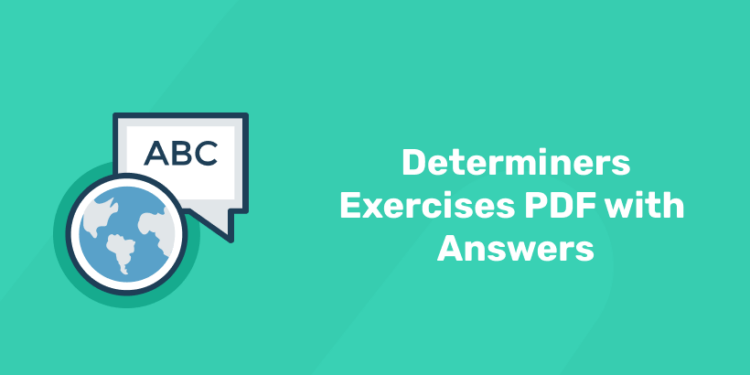Table of Contents
Introduction
Determiners are essential parts of English grammar that come before nouns to specify what the noun refers to, how many there are, or who owns it. They help make sentences clear by giving precise information about the noun and guiding the listener or reader’s understanding. For example, in “this book,” the determiner this points to a specific book, while in “many books,” many tells us the quantity. Mastering determiners is vital for learners to improve accuracy in writing and speaking, especially in differentiating between general and specific meanings.
In this blog, you will find explanations of various types of determiners, along with exercises to practice their correct use. These exercises will boost your grammatical precision and fluency in English. Whether you are a beginner or brushing up your skills, practicing determiners through carefully structured exercises with answers will greatly enhance your command over the language. This blog also includes a free downloadable PDF full of exercises so you can practice offline too.
Kinds of Determiners
1: Which of the sentences below is grammatically correct?
Determiners are words that come before nouns to clarify which thing we are talking about, how many there are, or who owns it. They are essential in English grammar to make meaning clear and specific. The main kinds of determiners include:
1. Articles
Articles identify whether a noun is specific or general:
-
Definite Article: the — refers to a specific item known to the listener or reader.
Example: The book on the table is mine. -
Indefinite Articles: a, an — refer to any non-specific item, used before singular nouns.
Example: I saw a cat in the garden.
Articles help distinguish if the noun has been previously mentioned or if it’s introduced for the first time.
2. Demonstrative Determiners
These point out specific nouns in relation to the speaker based on distance (in space or time):
-
this (singular, near)
-
that (singular, far)
-
these (plural, near)
-
those (plural, far)
Example: This car is newer than that one.
3. Possessive Determiners
These indicate ownership or association and include:
-
my, your, his, her, its, our, their
Example: Her bag is on the chair.
Possessive determiners specify whose item or person is being talked about.
4. Quantifiers
Quantifiers specify the amount or quantity of a noun, whether countable or uncountable:
-
some, any, many, few, several, all, enough, most, a lot of
Example: We have several books to read.
Quantifiers help express indefinite quantities or amounts.
5. Numbers
Numbers function as determiners when placed before nouns to specify exact quantities:
-
one, two, three, etc.
Example: I bought three apples.
6. Distributive Determiners
These refer to individual members within a group, often emphasizing singularity in distribution:
-
each, every, either, neither, both
Example: Each student must submit the assignment.
7. Interrogative Determiners
Used to ask questions about the noun, such as:
-
which, what, whose
Example: Whose book is this?
Each type of determiner plays a distinct role in specifying nouns, improving clarity and precision in sentences. Understanding and practicing these various kinds will help you master English grammar effectively.
| Determiner Category | Description | Examples |
|---|---|---|
| Articles | Specify if noun is general or specific | a, an, the |
| Demonstrative Determiners | Point to nouns based on proximity (near/far) | this, that, these, those |
| Possessive Determiners | Indicate ownership or association | my, your, his, her, its, our, their |
| Quantifiers | Express quantity or amount (countable/uncountable nouns) | some, any, many, few, several, enough |
| Numbers | Specify exact quantity | one, two, three, etc. |
| Distributive Determiners | Refer to individual members within a group | each, every, either, neither, both |
| Interrogative Determiners | Used to ask questions about the noun | which, what, whose |
Examples in Sentences:
-
The cat is sleeping. (Article – definite)
-
This book is interesting. (Demonstrative)
-
Her car is parked outside. (Possessive)
-
I have many friends. (Quantifier)
-
She ate three slices of pizza. (Number)
-
Each student must submit their homework. (Distributive)
-
Which color do you prefer? (Interrogative)
Spoken English Course for Guaranteed Confidence and Career Growth
Spoken English Course by Entri App: Enhance your communication skills, gain certification, and boost your career with confidence.
Join Now!Choose the correct determiners for the following sentences:
- What _____ beautiful flower! (a/ the)
- Aditi wants me to lend her ________ car. (that/ my/ her)
- Neeraj is _______ doctor. (a/ an/ the)
- I need to buy _______ new furniture for my apartment. (any/some)
- My uncle is _____ richest man in the town. (a/ the)
- Mount Everest is _________ highest peak in _________ Himalayas. (a/ an/ the)
- ______ clothes made in our factory are very cheap. (a/ the)
- We heard _____ noise. _____ noise came from a neighbour’s house. (a/ an/ the)
- Can you bring me _______ water when you come back? (some/ any)
- The inquiry officer asks about the incident _____ happened yesterday. (that/ which)
- Who is ________ fellow? (that/ those)
- Ravi is _______ best singer in the school. (an/ the)
- This car can be driven at ________ speed of 180 kilometres ________ hour. (a/ an/ the)
- The gardener waters ________ plants every day. (his/ their)
- The dog licked its paw. (his/ its)
- I need ___________ help with my homework. (any/ some)
- We invited ______ colleagues over to our house for ____ barbecue party. (a few/few; a/an/the)
- I used to live in ____ house. (this/that/these)
- Is there _______ way we can get to the airport faster? (any/ some)
- Our teacher didn’t give us ___________ homework yesterday. (some/ any)
- _____ qualifications do you have? (whose/ what/ which)
- _____ is your residential address? (which/ where/ what)
- She is wearing a beautiful ring on _____ finger. (her/ their)
- Can I get ___ hot bowl of soup? (a/ an)
- He went to the shopping mall with_______ younger sisters. (his both/ both his/ two his)
- Could you please bring me ______ books I left in _____ garden? (these/ those; the/ a/ an)
- Thomas read ___________ interesting books last month. (any/ some)
- The book belongs to ___. (her/ hers)
- I’m tired. Do we have ___________ time to take a nap? (any/ some)
- He turned on ______ television. (the/ an)
Fill in the blanks with appropriate determiners:
- Have you visited _______ foreign countries recently?
- The book on the table belongs to _____ library.
- ____ dog is ___ faithful animal.
- ____ rich should help ____ poor.
- I have got _____ cold.
- Most of ______ students were absent from ______ class.
- ______ tiger is _____ fierce animal.
- Although he’s very ill, he didn’t take _______ medicine.
- How _______ time do you need to finish the work?
- Honesty is ______ best policy.
- Kalidas is ________ Shakespeare of India.
- Sri Lanka is to ________ South of India.
- Where is ________ pen I bought last week ?
- I saw _______ nest of ______ owl on ______ tree.
- Please open _______ window.
- Open _______ book and read ________ passage.
- June is _______ hottest month of _______ year.
- I shall be back in _______ hour.
- Can _______ blind see ?
- What is ______ matter ?
Join our Spoken English program today and communicate with ease!
Find out the error or determiners in the sentences given below and correct them:
- He is a boy who helps me in need.
- Everyone takes little time to settle down at a new place.
- I am going to post office. It is near the central park.
- Sara wrote much of her poems when she was young.
- That is beautiful house.
Answers:
- He is the boy who helps me in need.
- Everyone takes a little time to settle down at a new place.
- I am going to the post office. It is near the central park.
- Sara wrote many of her poems when she was young.
- That is a beautiful house.
Spoken English Course for Guaranteed Confidence and Career Growth
Spoken English Course by Entri App: Enhance your communication skills, gain certification, and boost your career with confidence.
Join Now!Conclusion
Determiners are a fundamental part of English grammar that help clarify the meaning of nouns by providing information about quantity, possession, specificity, or identity. Whether it’s distinguishing between “a book” and “the book,” or identifying ownership through words like “my” and “their,” determiners make sentences more precise and meaningful. Mastering the use of different kinds of determiners—articles, demonstratives, possessives, quantifiers, numbers, and more—is essential for anyone aiming to improve their reading, writing, and speaking skills in English.
To truly grasp determiners and use them confidently, regular practice through exercises is key. This blog’s thoughtfully designed exercises coupled with detailed answers serve as an effective resource to sharpen your understanding and application of determiners. Practice consistently, refer back to examples, and soon you’ll find that using determiners correctly becomes second nature—enhancing both your clarity and confidence in English communication.
Spoken English Course for Guaranteed Confidence and Career Growth
Spoken English Course by Entri App: Enhance your communication skills, gain certification, and boost your career with confidence.
Join Now!Frequently Asked Questions
What are determiners in English grammar?
Determiners are words placed before nouns to clarify quantity, possession, or specificity. They ensure the noun’s meaning is clear, such as ‘a,’ ‘the,’ ‘my,’ or ‘some.’
How do you use articles like "a," "an," and "the"?
‘A’ and ‘an’ are indefinite articles used before nonspecific nouns (‘a cat,’ ‘an apple’). ‘The’ is a definite article used for specific nouns previously mentioned or known to the listener.
What is the difference between determiners and adjectives?
Determiners modify nouns by specifying reference or quantity without describing qualities, while adjectives describe qualities or attributes of nouns.
Which words are possessive determiners?
Possessive determiners show ownership, like ‘my,’ ‘your,’ ‘his,’ ‘her,’ ‘our,’ and ‘their.’ They appear before a noun to indicate possession.
How to choose the correct quantifier?
Quantifiers depend on whether the noun is countable or uncountable. Use ‘many’ or ‘few’ for countable nouns, and ‘much’ or ‘little’ for uncountable nouns.
Can determiners be used with plural nouns?
Some determiners, such as ‘some,’ ‘many,’ and ‘few,’ can be used with plural nouns, while others like ‘a/an’ cannot.
What are common mistakes with determiners?
Mistakes include using multiple determiners before a noun, incorrect article use, or mixing up quantifiers with countable vs uncountable nouns.













